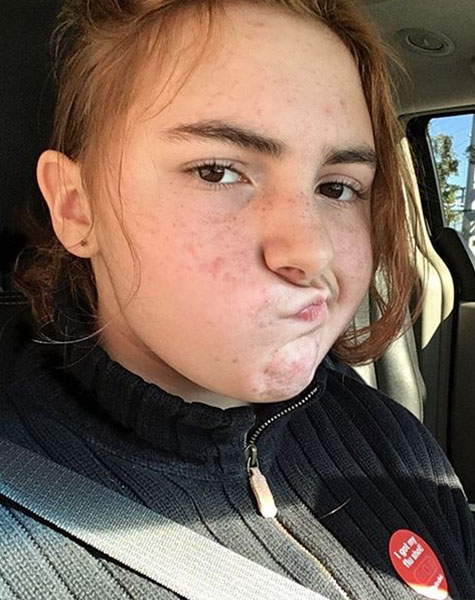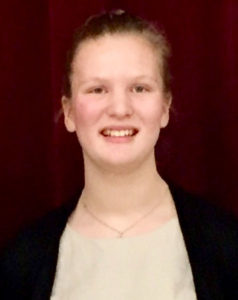Meet the Student Researchers

Adi Gamache (he, him)
Family members: mom, dad and two younger brothers
Current favorite song: It Will Come Back by Hozier
What’s one thing people wouldn’t know just by looking at you: I’ve played over 300 hours of a farming simulator game.
How you have coped through the pandemic: Playing a lot of video games and drawing
Why you joined YARI: Because I’ve always had a difficult time with the school system and education, and I think that students’ voices are important in changing that.
Improvements in education you’d make: education should be personalized for the student, along with the understanding that no one size fits all in education. I also think that there should be reduced class sizes and more emphasis on hands-on learning experiences

Orah Donovan (she, he, her, him)
Birthplace: Baltimore, MD
Family members: Mom, dad, three siblings and over 100 people in my extended family
Current favorite music: Out Of My League – Fitz and the Tantrums
Favorite memory from this year: An entire class of kindergarteners started singing the Liberty Mutual jingle.
What’s one thing someone wouldn’t know just by looking at you: I’m a huge sci-fi nerd.
How you have coped with the pandemic: I have been playing piano and guitar.
Why you joined YARI: Because I have ADHD and am LGBTQIA+, I have faced a lot of challenges and carry a lot of unnecessary hurt in those areas. I wanted to create a question and research where change needs to be made to boost or accommodate students who are disabled, neurodivergent and/or LBGTQIA+.
Improvements in education you’d make: I think a more streamlined system for 504 plans should be in place in schools. We should also normalize training of teachers in how to support neurodivergent students.

"when it comes down to who gets a 504, it comes down to how much funding and budget the school has and how much it would cost to help that student"... but with that said a "teacher greatly impacts the learning" and words can stick with you. #yari #youthvoice pic.twitter.com/ljFAPN77cs
— Students at the Center (@StudentCntrHub) December 16, 2020
Interview Responses From the Youth Researchers
Tell us a little about your research project and how the pandemic affected it.
Adi: The project is about accessibility and accommodations and how teachers and students interact with students with learning differences/disabilities. We interviewed and asked people questions about their experiences. The pandemic made this part slightly difficult. We did manage to work it out on zoom.
Orah: For this project, it was important for us to figure out how can we fix the systemic issues related to accommodations and teaching students with learning differences. As we went through the project, we considered whether we were asking the right questions. The pandemic opened our eyes, but it also limited who we can talk to and limited the large swaths of data we were anticipating.
What supports were most helpful in carrying out the project?
Adi: Our meetings with the YARI group and the adult researchers were helpful. Because it was during the pandemic, we didn’t know how to get on with our project and they helped refocus us. We were surprised by how accommodating people were to the situation, especially the people we interviewed. It was a good experience.
Orah: We have had a lot of email threads and zoom sessions through the summer talking about what we can do. We worked asynchronously to finish Google forms, etc. But it would be a lot easier if we could sit down all together.
Read the takeaways our adult partners had from working with youth researchers who are twice-exceptional.
What are your future aspirations? How has the YARI project influenced them?
Adi: In the future, I want to be an artist. My main passion is art. I don’t know if the YARi project has impacted it. But the reason I love art is that it can change perspectives and how people look at the world. That’s also what this project is about. Through how we view the world, we can change it.
Orah: As a student at the intersection, I have a lot of ideas, experiences and perspectives. I can use my voice and start talking to people and politicians. This project helped me step back: what do I really want to do in the future? Strong emotions get logged easier and I have a lot of strong negative emotions when it comes to schooling. So how can I make it easier for others? It’s really helped me figure out that this is more than just what keeps me up at night. Education reform is something I actively want to do.
What have you learned from this project?
Adi: I learned a lot about researching and about the experiences of other students through interviews. Honestly, it was surprising what we heard. We learned about dilapidated buildings, mice, segregated classrooms and other depressing stories that represent some of the experiences students have had in Providence schools.
Orah: We learned there’s a lot change that needs to be made in schools to treat students with disabilities better. I learned that I am extremely passionate about education. It’s now really getting personal and realized how much I had witnessed myself and didn’t speak up about it. And sometimes I had spoken about it and had been ignored. It’s thrilling that I might be able to make change and that’s really what’s keeping me going.
Read more about the YARI project: goals, activities, local partners and implications.
What advice would you give adults who support learners like you?
Adi: Give students the tools! A lot of kids feel like their opinions don’t matter, or they’re not special, or they’re not important enough to make a difference in anything. And I think you need to help them know that they have the ability to do things that matter, that they can change things.
Orah: When we interviewed teachers, they believe smaller class sizes would help. Adults should have the time and space to be more personalized in their approaches in educating others. It’s a lot harder to help students when you have over 150. Students, teachers and parents should all get a chance to get to know each other.
Funding for this study provided by the Nellie Mae Education Foundation and the Oak Foundation.